Imported coal being burned by the ESB to supply homes across Ireland is destroying the lives of communities in northern Colombia, according to people who live near the main mine from which that coal is sourced.
They spoke to Luke Holland, a campaigner and journalist who visited the mine, and supplied footage and interviews with local people to Prime Time.
"The environment here, before, when I was little, it was all pasture," Yalenis Medina said. She lives in a small community of approximately two kilometres from the perimeter of the mine.
"It was all grass but... now, it’s totally dry, the grass doesn’t grow, we have the noise of the trucks, pollution, and coal dust 24 hours a day."
A vast scar torn into a once-verdant landscape, the Cerrejón coal mine in the region of La Guajira, Colombia, covers some 700 square kilometers - an area comparable to Co Louth.
According to local communities, lawyers’ organisations and court rulings, in its four decades of operation it has driven an environmental crisis that has destroyed the health, lives, and culture of many thousands of indigenous people.
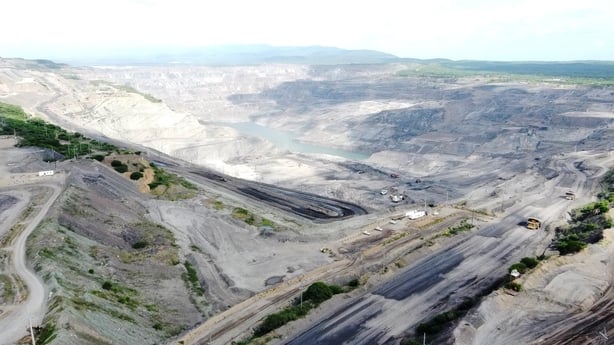
A 2015 report by the Colombian Ombudsman for Human Rights attributed the deaths of some 5,000 children to a nutritional crisis caused in large part by the mine, and the devastation has continued in the years since.
Most of the victims came from the Wayúu indigenous community, who trace their history in the region near the mine back some 3,000 years. That community has now been declared in danger of extinction by Colombia's Constitutional Court.
The majority of births and deaths in the Wayúu community are not recorded by State institutions, however. Indigenous community leaders claim closer to 15,000 children's deaths to the crisis.
In 2018, in the wake of international outrage, Colombian criticism, and legal campaigns, some companies - including the ESB - stopped sourcing coal from Cerrejón.
Prior to that, million tons of coal had been transported directly from the Colombian mine to Moneypoint in west Clare, where it was burned to power the Irish national grid.
During that period, the bulk of all the coal imported to Ireland came from Cerrejón.
In the run-up to 2018, reliance on coal had been falling as the ESB focused on developing renewable sources. The concern about Cerrejón led it to begin importing from other countries instead.
However, when Russia's invasion of Ukraine provoked an energy crisis, it restarted Colombian purchases in 2022.
Since then, Prime Time has established there have been six deliveries.
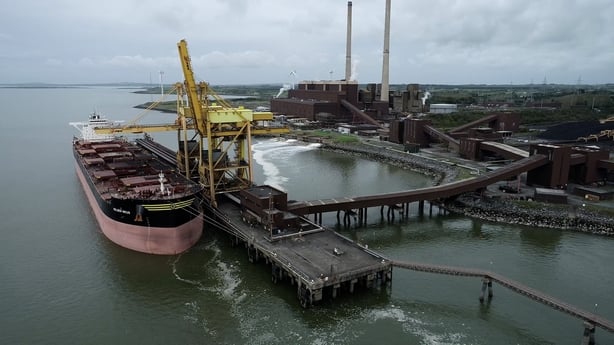
(Credit: Canola Pictures)
Over the years, the coal mining activities have polluted water supplies, diverted water courses and displaced whole communities, while others - like Yalenis’s - say they are being forced out of existence.
The José Alvaro Restrepo lawyers' collective (CAJAR), one of Colombia's leading human rights organisations, says that 35 communities have been forced to move away due to the mine. Just five successfully resettled elswhere.
"We’ve been able to corroborate that there are major impacts on human rights, on the environment and in the territory," says Rosa María Mateus Parra, a lawyer with CAJAR.
"There are entire communities who are sick, there are boys and girls who have died due to the contamination of the air. There are impacts on the ecological equilibrium, to the environment [but] the most emblematic issue is the projects to divert and exploit the water sources."
Cerrejón's demand for water, and the relentless dumping of contaminated waste water into the surrounding creeks and rivers, have proved devastating for the communities that remain.
The Switzerland-based company, Glencore, which ultimately owns the mine, disputes that. It claims "the overwhelming majority is used by the agricultural sector."
However, the environmental organisation CINEP estimates that Cerrejón consumes and contaminates 24 million litres of water each day.
And in a region that already suffered water scarcity, it has also made dozens of interventions into the natural hydrological system.
At least 17 rivers or streams have been diverted, in the process undermining the viability of communities nearby, many of which believe there is a spiritual connection to the streams and rivers.
"More than 2,000 people depend directly on this water," Leobardo Sierra, a community leader, said as he stood on the riverbank of one of the few remaining flowing sources of water nearby.
"The water shows us how to be and how to subsist. It tells us what we must do, and how we must do it. We use this water for everything, for consumption, to wash, to bathe to feed our animals, to water our crops. We need these waters for everything."
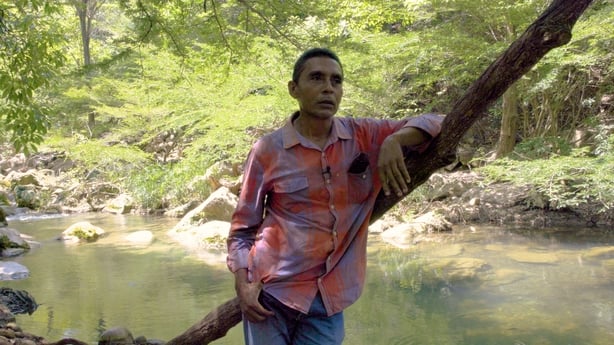
Locals say the mining drains water from the rivers and groundwater and pollutes what’s left.
The company which own the mines says it "regularly monitors water quality" though an accredited institute, and "results show compliance with national regulations for each water body."
"It is important to note that upstream of Cerrejón are rice and palm plantations and discharge points for wastewater from the treatment systems," it said in a statement.
According to legal papers filed with the OECD as a part of an international legal effort to curtail the damage from the mine, in 2019 alone, Cerrejón dumped 578 million litres of liquid waste into natural bodies of water.
Beyond the environment, studies by the Colombian environmental research organisations CINEP and CENSAT say that the communities living in the mine's hinterland suffer dramatically elevated rates of respiratory illness, as do the workers employed at the mine itself.
Local communities say coal dust - from both the mine and the train which runs 24 hours a day from the pits to the Bolivar port 150 kilometers away - impact the surrounding countryside.
In 2015, the case of three-year-old Wayúu boy Moisés Guete Uriana provoked a national outcry in Colombia. Lawyers from CAJAR took a case on his families’ behalf in which they showed he had been experiencing severe respiratory problems and been vomiting blood.
He grew up just a few kilometres from the mine.
A Circuit Court judge subsequently ordered Cerrejón to reduce the particulate air pollution it was causing.
Yet five years later in 2020, Christian Aid - which works with Colombian campaign groups on issues related to the mine - reported that "to date there has been no meaningful effort to comply with the order."
Since then, community leaders say there’s been no further improvement.
It is not just the indigenous Wayúu community who are suffering. Afro-colombian communities are also living in the area - they were brought to the region as slaves centuries ago and have lived in harmony side-by-side with the Wayúu for hundreds of years.
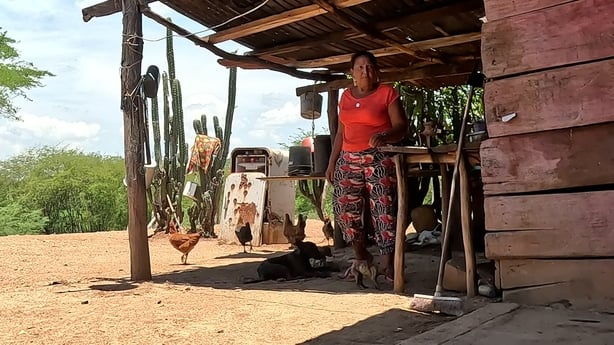
As the mine’s footprint has spread over its four decades of operation, many have been forcibly displaced. In one of the most notorious incidents in 2001, bulldozers were used to raze homes and properties.
Sintracarbón, the union representing workers at Cerrejón, backs the complaints of the indigenous and afro-colombian communities, despite knowing that the success of those demands could ultimately damage their own livelihoods.
Following cases and complaints from locals and union representatives, Colombia's courts began trying to put a halt to some of the activities related to the mine.
The Colombian Constitutional Court has issued no less than 14 rulings against Cerrejón, demanding that it take action on a spectrum of issues: human rights violations, displacement of communities, interventions in the water system, environmental damage, harms to health, the lack of meaningful consultations with impacted communities over various iterations of expansion.
The Administrative Court of Riohacha, the nearest major city, and Colombia’s State Council have also sought to intervene.
Despite this torrent of judicial interventions, the lawyers group, CAJAR, says that the various rulings have in large part been either ignored or only partially implemented.
They're calling for companies like the ESB, and countries like Ireland, to stop purchasing coal from such sources.
"Governments should not buy coal from this kind of company that harms human rights, they shouldn’t buy coal from a company that has been legally declared responsible," says Rosa María Mateus Parra, a lawyer with CAJAR.
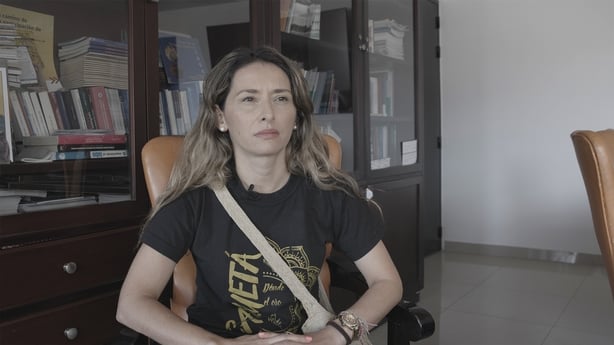
Community leaders agree. "You want to live a life of kings, at the cost of the energy that is causing our death here in our territory," says Yalenis Medina, an Afro-colombian community leader.
"It’s not ok. You are thoughtless. Forgive me, but this is causing that we are being killed. It’s not fair that our animals, our territory, our families die so that you can have what, for you, is happiness."
In response to queries about the issues raised in this piece, the ESB provided a statement.
"ESB has always taken its responsibilities in relation to coal procurement very seriously," the statement says.
"Since 2018, ESB coal purchases from the Cerrejón mine have been very limited. In total since 2018, ESB’s purchase of coal sourced from the Cerrejón mine amounted to circa 1% of the total produced by the mine."
"In 2014, ESB joined Bettercoal, an organisation established by a group of coal buyers - not coal producers - which aims to promote continuous improvement in the mining and sourcing of coal for the benefit of all people affected by the industry."
"ESB has used its membership of Bettercoal to ensure activities at Cerrejón are assessed and monitored on an ongoing basis against 12 key principles including human rights, workers’ rights, ethics, community engagement, environment, pollution, biodiversity and compliance with laws and regulations."
Bettercoal is membership organisation established in 2012. Its stated aim is to examine and improve standards and sustainability in their coal supply chain.
Glencore, the company which owns the mine also said it "supports rigorous social, labour and environmental practices, and seeks to align its practices to international standards."
In the eyes of the impacted communities, it is 'rights washing' and 'green washing.’
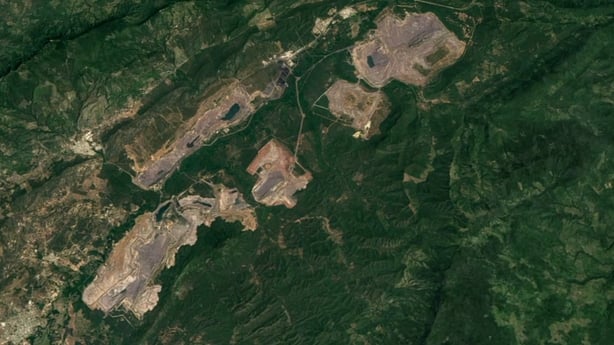
(Image: Google Earth)
"The coal that is arriving to Europe is coal that is stained with blood," says Rosa María Mateus Parra of CAJAR. "It is coal that bears the tears of countless mothers who have had to attend the health problems of their children without any form of support."
Against this backdrop, the Global Legal Action Network (GLAN), based in Ireland, and a coalition of partner organisations, has taken a complaint against the ESB through the Organisation for Economic Cooperation and Development's (OECD) corporate accountability system.
GLAN calls itself a public interest law firm, and pursues legal challenges against States and companies internationally for what it alleges are human rights violations.
Ireland is an OECD member state, and each member state has an OECD 'National Contact Point' tasked with receiving and handling complaints brought forward.
The GLAN complaint says the ESB purchases coal from the Cerrejón mine "with full knowledge of the human rights violations and environmental harms occurring" and that this "does not align with the company’s due diligence duties."
An initial assessment in 2022 found the complaint merited further examination.
In September 2023, the ESB and local communities agreed to consider entering a mediation process.
That is due to begin in "early 2024," according people involved in the plan.
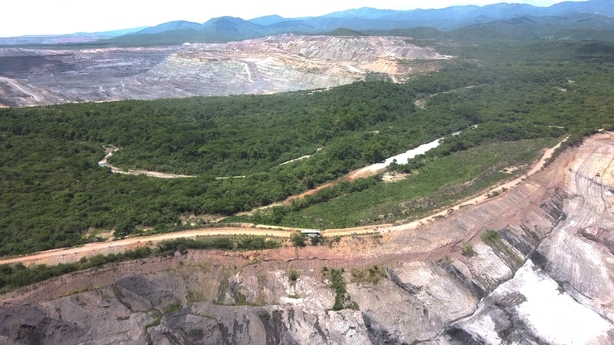
Under the case, the ESB may be required to demand Cerrejón remedy the harms its purchases have contributed to.
In repsonse to questions from Prime Time in relation to this article, the ESB said it now "is not anticipating any further shipments of coal from Cerrejón to Moneypoint."
On the mediation process, it said it "has signalled its willingness to engage in this process and discussions are ongoing in relation to the proposed mediation process. For clarity, participation by all parties is entirely voluntary."
In the meantime, coal is still being exported daily from Latin America’s largest mine, in a remote and impoverished region of a country where legal enforcement is often weak, and corruption rife.
Despite the efforts of the courts, activists, and of course the Wayúu and afro-descendent communities themselves, the mine continues to operate with relative impunity.
And activists say the ESB has contributed to funding the devastation it causes.
Meanwhile, Glencore, the Swiss-based company which ultimately owns the mine, paid out €6.5 billion to its investors last year, after posting record annual profits.
Additional reporting: Mark Coughlan.
Luke Holland's film from Colombia features on the 26 March edition of Prime Time, broadcast on RTÉ One television at 9.35pm.

